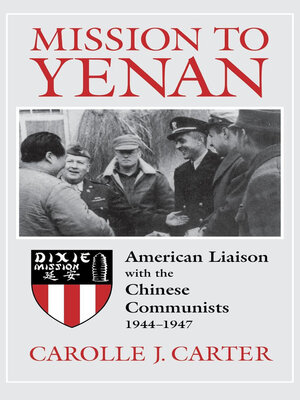Mission to Yenan
ebook ∣ American Liaison with the Chinese Communists, 1944–1947
By Carolle J. Carter

Sign up to save your library
With an OverDrive account, you can save your favorite libraries for at-a-glance information about availability. Find out more about OverDrive accounts.
Find this title in Libby, the library reading app by OverDrive.



Search for a digital library with this title
Title found at these libraries:
| Loading... |
A deep dive into the Dixie Mission. "Aficionados of American political and diplomatic history may be pleasantly surprised at the riches in this book." —American Historical Review
Conventional wisdom informs us that "only Nixon could go to China." In fact, in 1944, nearly thirty years before his historic trip, the American military established the first liaison and intelligence-gathering mission with the Chinese Communists in Yenan. Commonly referred to as the Dixie Mission, the detached military unit sent to Yenan was responsible for transmitting weather information, assisting the Communists in their rescue of downed American flyers, and laying the groundwork for an eventual rapprochement between the Communists and Nationalists, the two sides struggling in the ongoing Chinese Civil War.
Following extensive use of archival sources and numerous interviews with the men who traveled and served in Yenan, Carolle Carter argues that while Dixie fulfilled its assignment, the members steered the mission in different directions from its original, albeit loosely described, intent. As the months and years passed, the Dixie Mission increasingly emphasized intelligence gathering over evaluating their Communist hosts' contribution to the war effort against Japan.
Some American politicians in the 1950s portrayed the participants in the Dixie Mission as too sympathetic to the Chinese Communists. But during the 1970s many looked back at these individuals as wise but ignored oracles who could have prevented the "loss of China." Carter strips away these simplistic portrayals to reveal a diverse and dedicated collection of soldiers, diplomats, and technicians who had ongoing contact with the Chinese Communists longer than any other group during World War II, but who were destined to be a largely unused resource during the Cold War.
Conventional wisdom informs us that "only Nixon could go to China." In fact, in 1944, nearly thirty years before his historic trip, the American military established the first liaison and intelligence-gathering mission with the Chinese Communists in Yenan. Commonly referred to as the Dixie Mission, the detached military unit sent to Yenan was responsible for transmitting weather information, assisting the Communists in their rescue of downed American flyers, and laying the groundwork for an eventual rapprochement between the Communists and Nationalists, the two sides struggling in the ongoing Chinese Civil War.
Following extensive use of archival sources and numerous interviews with the men who traveled and served in Yenan, Carolle Carter argues that while Dixie fulfilled its assignment, the members steered the mission in different directions from its original, albeit loosely described, intent. As the months and years passed, the Dixie Mission increasingly emphasized intelligence gathering over evaluating their Communist hosts' contribution to the war effort against Japan.
Some American politicians in the 1950s portrayed the participants in the Dixie Mission as too sympathetic to the Chinese Communists. But during the 1970s many looked back at these individuals as wise but ignored oracles who could have prevented the "loss of China." Carter strips away these simplistic portrayals to reveal a diverse and dedicated collection of soldiers, diplomats, and technicians who had ongoing contact with the Chinese Communists longer than any other group during World War II, but who were destined to be a largely unused resource during the Cold War.






